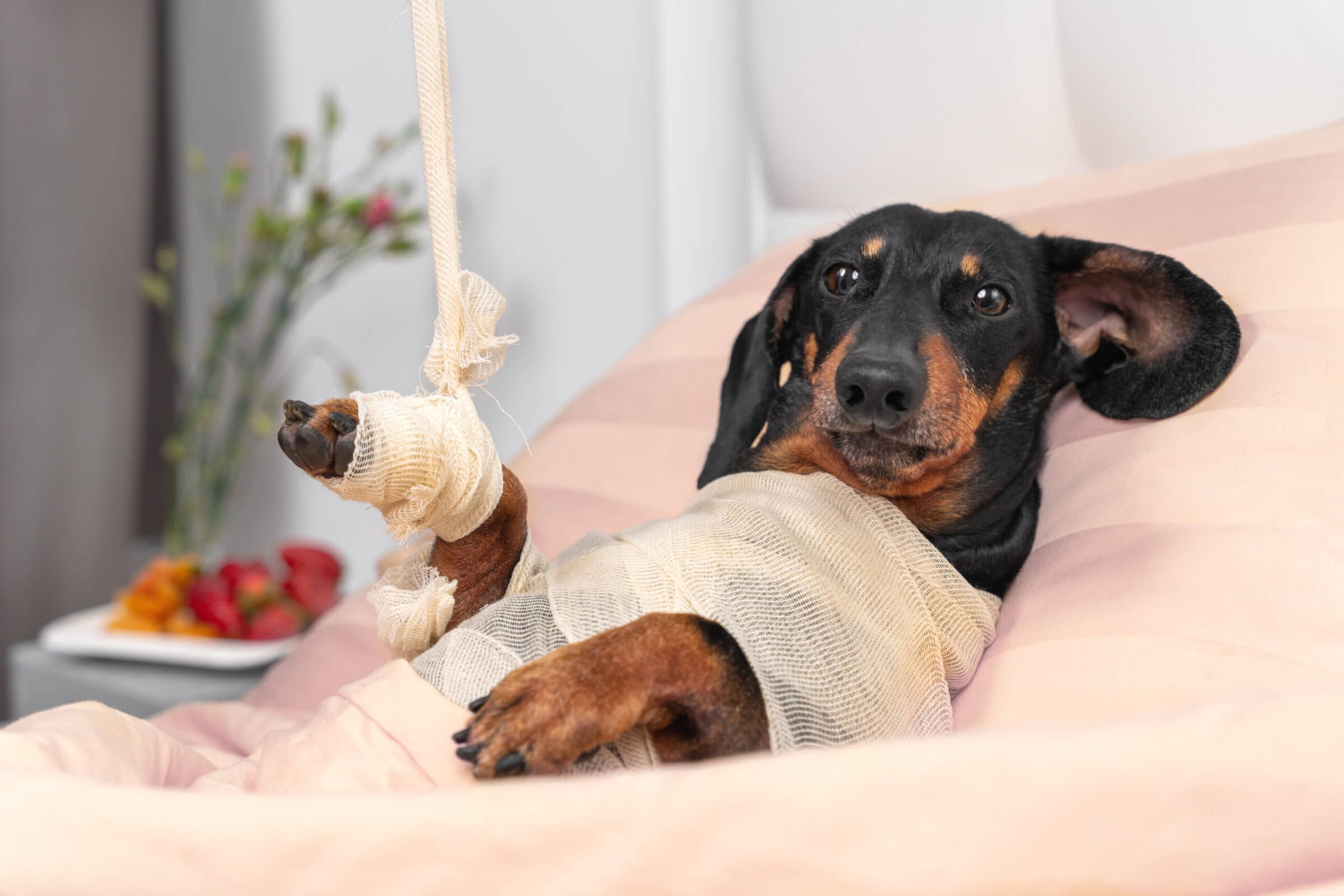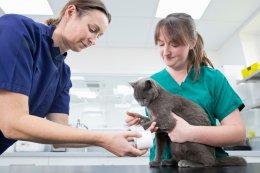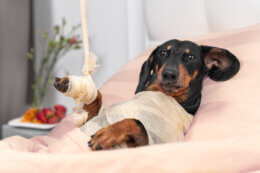
For us humans, the summer season brings parties, beaches and great food, yet it can be a nightmarish few months for our pets. From the soaring mercury that brings in heat stroke to toxic ticks and snakes, Compare the Market is urging pet owners across Australia to be aware of the dangers lurking around the corner this Christmas.
With many cities across the country experiencing heatwaves already in early December, experts are warning that it will be a hotter and drier summer than we’ve experienced for the past few years. This weather is also a danger for many of our pets, as they may not be able to cool themselves down as we humans do. Ranging from heat stress up to heat stroke, some common signs pet owners should look out for include (but are not limited to):
- Increase in panting or difficulty breathing
- Goopy, thick drool or saliva
- Change in colour of the gums (very red or very pale)
- Dizziness
- Lethargy, lying down due to weakness and/or collapsing
- Increased heart rate
- Vomiting
- Diarrhea
Speaking on what pet owners should be doing if they see their pet showing signs of heat stroke, Compare the Market’s Executive General Manager of General Insurance and pet insurance expert, Adrian Taylor, said that people should take immediate steps to cool the pet down.
“The heat affects our pets more than it does us, and while we may be able to set the aircon to a lower setting or take off a layer of clothing, our pets can’t do anything like this,” Mr Taylor said. “If people see their pet showing signs of heat stroke such as struggling to breathe, vomiting or drooling a lot more than usual, the best first step is to spray them with cool, not ice-cold, water and point a fan at them.
“Additionally, where possible keep them inside in an airconditioned room and make sure they have plenty of water available to drink..
“If the pet’s symptoms continue despite your efforts to cool them down, a trip to the vet is a must.”
Another thing on Santa Paw’s naughty list for this year is toxic ticks.
Despite being a small insect, ticks, particularly paralysis ticks, can wreak havoc on your pet, potentially leading to respiratory or heart failure. Known to habit the Eastern Coast of Australia, paralysis ticks typically become more active in the late spring and early summer. However, cases happen all year around, so it pays to be vigilant all the time.
Mr Taylor said there are multiple ways to protect pets against ticks.
“The best way to protect pets from ticks is to use an effective tick prevention product on your pet all year round. The ones that work best are ones that both repel and kill ticks before they sink their teeth into your cat or dog, as this will prevent tick-borne diseases in your pet as well,” Mr Taylor said.
“Another crucial thing owners should do is check their pet’s body for any small lumps or bumps. Make sure you check across the torso, ears, around and in the gums, as well as those hard-to-reach places like in between the toes, where the little bloodsuckers can hide away.
“Lastly, if you find a tick on your cat or dog, remove it immediately. Using fine-tipped tweezers or specialised tick-removal tools, gently ply the tick straight upwards to remove the whole tick, as leaving the head, and therefore the toxins, in the skin will continue to affect your beloved pet.
“If you do find that the head of the tick has broken off, or your pet is having adverse effects to the toxins, such as vomiting, change in voice or bark, difficulty breathing general weakness, you should take your pet to the vet immediately to get treatment.”
Snakes are another thing that pet owners need to look out for. With Australia being home to over 140 different species of snakes, over 100 of which are venomous, there’s every chance you or your four-legged furry friend will come across one or two in your lifetime.
In the unfortunate event that you and your pet not only come across a snake but also get bitten, you need to get to the vet immediately, according to Mr Taylor.
“Time is of the essence if you do find that your pet has been bitten, as the quicker the vet is able to administer the anti-venom, the greater the chance that it will survive,” Mr Taylor said. “We can’t always be by the side of our beloved pets, so some symptoms of a snake bit to look out for include limping or sluggish movement, dilated pupils, paralysis, swelling around the area of potential bite and vomiting.”
And perhaps the most cloak-and-dagger danger to our pets this season is food from our table. While we often give our table scraps as a treat to our furry friends, these may be silent threats that could land your pup or kitten in hospitals with very big bills piling up for treatment.
Compare the Market’s recent research found that brunch-loving Millennials, are the most likely to think that giving their pets avocado and onions is a safe treat despite it being toxic and causing, diarrhea, vomiting and shallow breathing to name a few symptoms.
Gen Zers, on the other hand, were the most likely to think that giving cats and dogs sultanas, grapes and raisins, as well as chocolates and lollies are okay, with around one in 10 thinking that these treats are safe for consumption, despite even in small quantities, it the toxins found in these treats can easily kill a pet. So, Christmas puddings, sweet treats and fruit cakes are an absolute no-no for pets this Christmas.
| Toxic food for pets | % of total people who thought it was safe for pets to consume | % of Gen Z who thought it was safe for pets to consume | % of Millennials who thought it was safe for pets to consume | % of Gen X who thought it was safe for pets to consume | % of Baby Boomers who thought it was safe for pets to consume |
| Avocado | 7.7% | 8.0% | 11.8% | 7.9% | 3.4% |
| Grapes, sultanas and raisins | 5.5% | 12.0% | 8.8% | 4.5% | 0.6% |
| Chocolate/lollies | 5.0% | 10.4% | 7.8% | 3.8% | 1.3% |
| Alliums (onions, chives, garlic etc) | 2.7% | 1.6% | 6.1% | 1.5% | 0.9% |
| Alcohol | 1.3% | 1.6% | 1.7% | 1.5% | 0.6% |
Another thing that is commonly around the Christmas table is the quintessential Christmas ham. Mr Taylor commented that feeding your pets scraps off the Christmas table may harm them more than treat them.
“As much we might feel like we’re indulging our pets by giving them scraps of the Christmas ham or turkey, feeding your cat or dog the leftover meat from your plate can drastically disturb your pet’s pancreas, as a result of the high amount of fat in the meat we can tolerate as humans,” Mr Taylor said.
“Fatty meats like turkey skin, sausages, and pork crackling can cause a pet’s pancreas to go into overdrive and can even lead to lifelong medical issues such as pancreatitis.
“The summer season is also the time when families get together and celebrate, and therefore, there may be people interacting with your pet that may not know what is safe for your pet to eat. So if you find that your pet is behaving differently than usual, such as being more lethargic, avoiding eating or drinking or even vomiting, it’s best to get it checked out at the vet to ensure they haven’t eaten something toxic.
“But even a simple visit to the vet can rack up hundreds of dollars in bills. We know that the most common claim on pet insurance is gastro-related issues, with some of these treatments costing upwards of $2,000, depending on when the issue was caught. Something simple that can be done to reduce such financial burden on the off chance something like this does occur to your pet is to get pet insurance.
“So, if your pooch or kitten is being treated for heatstroke, a tick bite or admitted because they digested something that they shouldn’t have, you can count on pet insurance to give you some peace of mind, knowing that some of the costs will be covered.”
Mr Taylor’s top tips for protecting your pets this summer.
- Vets may not be open between Christmas and New Years. Knowing which 24/7 emergency clinics are located nearby, in case the worst happens, is a good idea. While the time between Christmas and New Years isn’t filled completely with public holidays, vets may have a Christmas shutdown period like many other businesses or operate outside their usual operating hours, which may not include evenings.
- Telehealth options may be available. An array of vet initiatives designed to keep their pets healthy and reduce veterinary expenses have been rolled out recently, including Dial A Vet, Webvet and more. These services allow you to pay a small fee for a video consultation with a certified vet. Keep in mind that if your pet is in life-threatening danger, you should always visit a vet in person.
- Understand the limits and excesses that apply on pet insurance. If you need to claim on your pet insurance, do you know how much money will be reimbursed and how much you may need to pay? Be sure to read your PDS carefully, as you could still be left out-of-pocket – even with cover.
*Compare the Market surveyed 1,005 Australians aged 18 and over in October 2023.
-ENDS-
For interviews and more information, please contact:
Noémi Hadnagy | m: 0433 377 252 | e: [email protected]
Compare the Market is a comparison service that takes the hard work out of shopping around. We make it Simples for Australians to quickly and easily compare and buy insurance, energy, and home loans products from a range of providers. Our easy-to-use comparison tool helps you look for a range of products that may suit your needs and benefit your back pocket.








